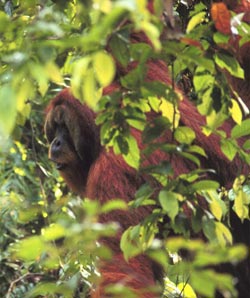Orangutans plan their future route and communicate it to others

Male Orang Utan<br>Picture: UZH<br>
In order to attract females and repel male rivals, they call in the direction in which they are going to travel. Anthropologists at the University of Zurich have found that not only captive, but also wild-living orangutans make use of their planning ability.
For a long time it was thought that only humans had the ability to anticipate future actions, whereas animals are caught in the here and now. But in recent years, clever experiments with great apes in zoos have shown that they do remember past events and can plan for their future needs. Anthropologists at the University of Zurich have now investigated whether wild apes also have this skill, following them for several years through the dense tropical swamplands of Sumatra.
Orangutans communicate their plans
Orangutans generally journey through the forest alone, but they also maintain social relationships. Adult males sometimes emit loud ‘long calls’ to attract females and repel rivals. Their cheek pads act as a funnel for amplifying the sound in the same way as a megaphone. Females that only hear a faint call come closer in order not to lose contact. Non-dominant males on the other hand hurry in the opposite direction if they hear the call coming loud and clear in their direction.
“To optimize the effect of these calls, it thus would make sense for the male to call in the direction of his future whereabouts, if he already knew about them”, explains Carel van Schaik. “We then actually observed that the males traveled for several hours in approximately the same direction as they had called.” In extreme cases, long calls made around nesting time in the evening predicted the travel direction better than random until the evening of the next day. Carel van Schaik and his team conclude that orangutans plan their route up to a day ahead. In addition, the males often announced changes in travel direction with a new, better-fitting long call. The researchers also found that in the morning, the other orangutans reacted correctly to the long call of the previous evening, even if no new long call was emitted. “Our study makes it clear that wild orangutans do not simply live in the here and now, but can imagine a future and even announce their plans. In this sense, then, they have become a bit more like us”, concludes Carel van Schaik.
Literature:
Carel P. van Schaik, Laura Damerius, Karin Isler. Wild Orangutan Males Plan and Communicate Their Travel Direction One Day in Advance. PLOS ONE. September 11, 3013.
About the authors
All three authors of the study are based at the Anthropological Institute and Museum of the University of Zurich. Carel van Schaik is the Director and has observed orangutans in the wild for many years. He maintains two field sites, one in Borneo and one in Sumatra. Laura Damerius carried out a pilot project for this study as part of her master’s thesis and is now working on her dissertation about the behavior of wild-living orangutans. Karin Isler studies the evolution of cognitive abilities of primates, mammals and birds.
Contact:
Prof. Dr. Carel van Schaik
Anthropological Institute and Museum
University of Zurich
Phone: +41 44 635 54 10
E-mail: vschaik@aim.uzh.ch
Media Contact
More Information:
http://www.uzh.chAll latest news from the category: Agricultural and Forestry Science
Newest articles

Machine learning algorithm reveals long-theorized glass phase in crystal
Scientists have found evidence of an elusive, glassy phase of matter that emerges when a crystal’s perfect internal pattern is disrupted. X-ray technology and machine learning converge to shed light…

Mapping plant functional diversity from space
HKU ecologists revolutionize ecosystem monitoring with novel field-satellite integration. An international team of researchers, led by Professor Jin WU from the School of Biological Sciences at The University of Hong…

Inverters with constant full load capability
…enable an increase in the performance of electric drives. Overheating components significantly limit the performance of drivetrains in electric vehicles. Inverters in particular are subject to a high thermal load,…





















